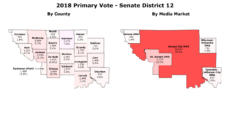Wisper Internet is making a substantial impact in the fight against the digital divide in Missouri, deploying a novel technology to expand broadband access to the unserved and underserved across the state.
A relatively new company, Wisper employs 200 workers across six midwestern states, serving more than 20,000 customers. But its story really began with CEO Nathan Stooke and just one client in 2003.
“My next-door neighbor needed internet at his office two miles away, and he would’ve had to pay $1,200 a month. I was his IT guy, and I did about six months of research to figure out how I could get him service,” Stooke told The Missouri Times. “We looked at everything we could, and I came across fixed wireless and realized if I could do this for him, I could do this for a lot of people. Everybody needs access to the internet.”
Stooke saw the potential in fixed wireless, which connects two or more structures through a wireless link to enable access between the two structures. He purchased his first batch of equipment for $36,000 and set to work, initially identifying himself to clients as an IT specialist rather than the CEO of a one-man internet company.
Nearly two decades later, an influx of federal dollars is being earmarked to bridge the digital divide with more focus on expansive technology like Wisper’s. The company was the second-biggest winner in the Federal Communication Commission’s Connect America Fund (CAF) in 2018, giving it $220 million to spread across six Midwest states.
Wisper won 60,000 Missouri locations in the CAF auction, with an estimated 200,000 homes covered under its builds since September, according to Stooke. He said around 20 towers were being equipped per month, with the hopes of reaching 60 percent of its CAF obligation next year — 20 percent more than is required by the Federal Communication Commission (FCC).
While Stooke’s company is based in Mascoutah, Illinois, its largest footprint is in Missouri with six offices scattered across the state.
Joplin was the first community to receive a new product in March after it emerged from the testing phase and yielded positive results. The technology, created by California-based tech company Tarana, allows signals to travel through heavily-wooded areas that typically block wi-fi signals for a maximum of eight miles, an advancement Stooke said changed the game for Wisper.
“This has been years in the making, and it’s incredible to see success after so much hard work and growth. I have had to grow as a person — this started with just me introducing myself as an installer to customers to now having almost 200 employees,” Stooke said. “I’m a very different person now, but I still have the same goals and the same drive to grow a larger company that loves our employees and loves our customers. The internet industry unfortunately doesn’t set the bar very high, but we want to change that. We are here to provide amazing service and while we make mistakes along the way, we have your best interests at heart and we do the best we can.”
Stooke said Wisper’s biggest obstacle in Missouri was public awareness. While other providers have been on the scene for decades, the fledgling company is trying to catch up with its marketing and promotion — though the company often finds that its successes speak for themselves. Stooke said communities often rallied behind the team once towers were operational, giving them just as much public buy-in as telephone and cable companies that have had a foothold in those areas for decades.
Stooke is still looking to expand the company further. He said there were 30 open positions with the company, offering high-tech jobs to expand IT workforce opportunities to rural areas across Missouri. Wisper is also primed to launch other broadband initiatives and research more emerging technologies in 2022 and beyond.
There’s plenty of work yet to be done: Missouri ranks No. 34 in broadband access with more than 147,000 unserved or underserved households and more than 392,000 individuals without reliable internet access, according to the Office of Broadband Development. Both the executive and legislative branches are prioritizing broadband investments as federal funds come in.
While the company has grown from a one-man operation to a true competitor in the broadband industry in recent years, Stooke said Wisper was just getting started in the Show-Me State and beyond.
“A lot of companies in America want to be big for the sake of being big, but I wanted to be big because I knew I was helping employees and their families and customers — that’s what drove me to want to be where no one else was,” Stooke said. “We want to figure out how to provide service to people that no one else can provide for. We’re very entrepreneurial problem solvers. If this was easy to do, the big companies would have come in and done it a long time ago.”

Cameron Gerber studied journalism at Lincoln University. Prior to Lincoln, he earned an associate’s degree from State Fair Community College. Cameron is a native of Eldon, Missouri.
Contact Cameron at cameron@themissouritimes.com.
































